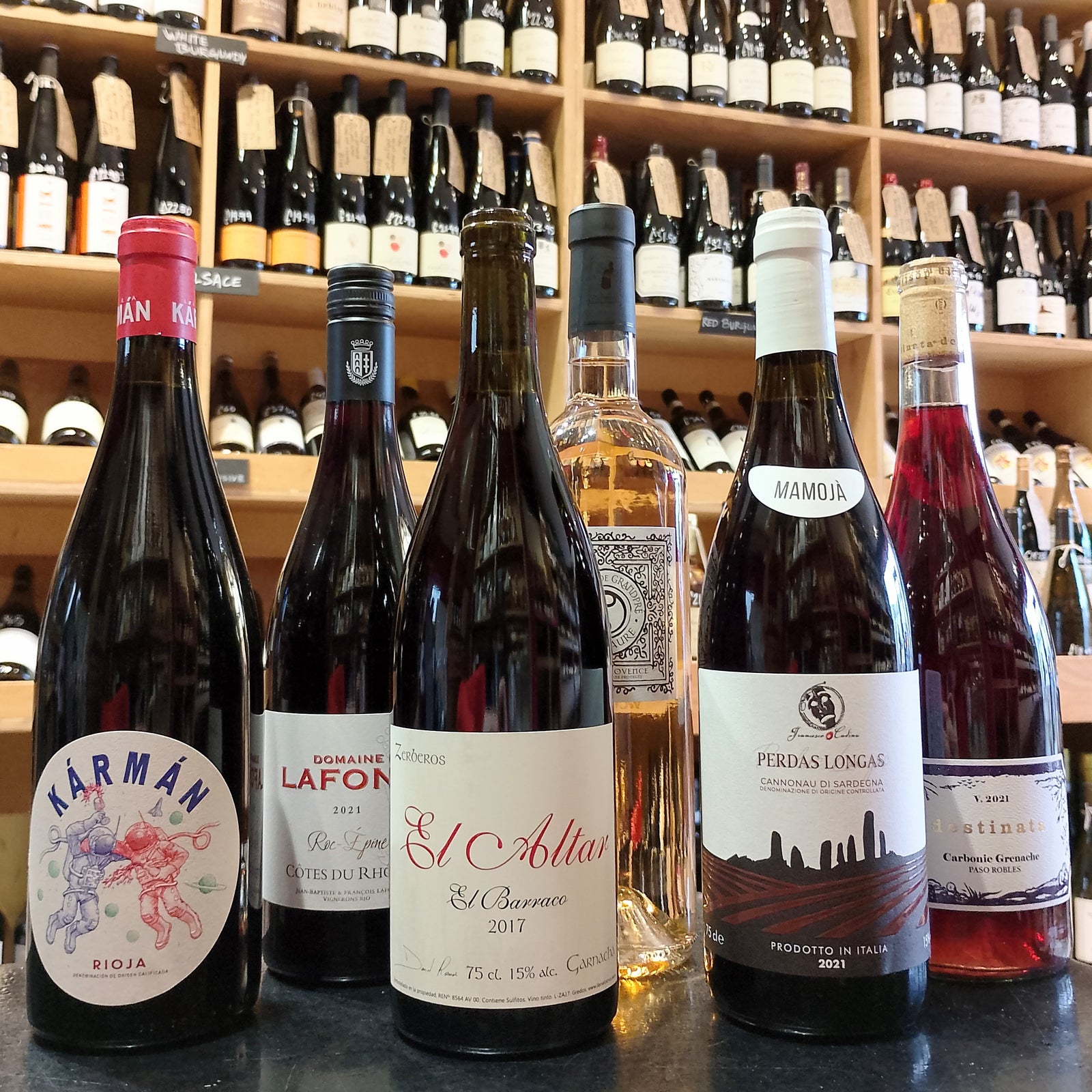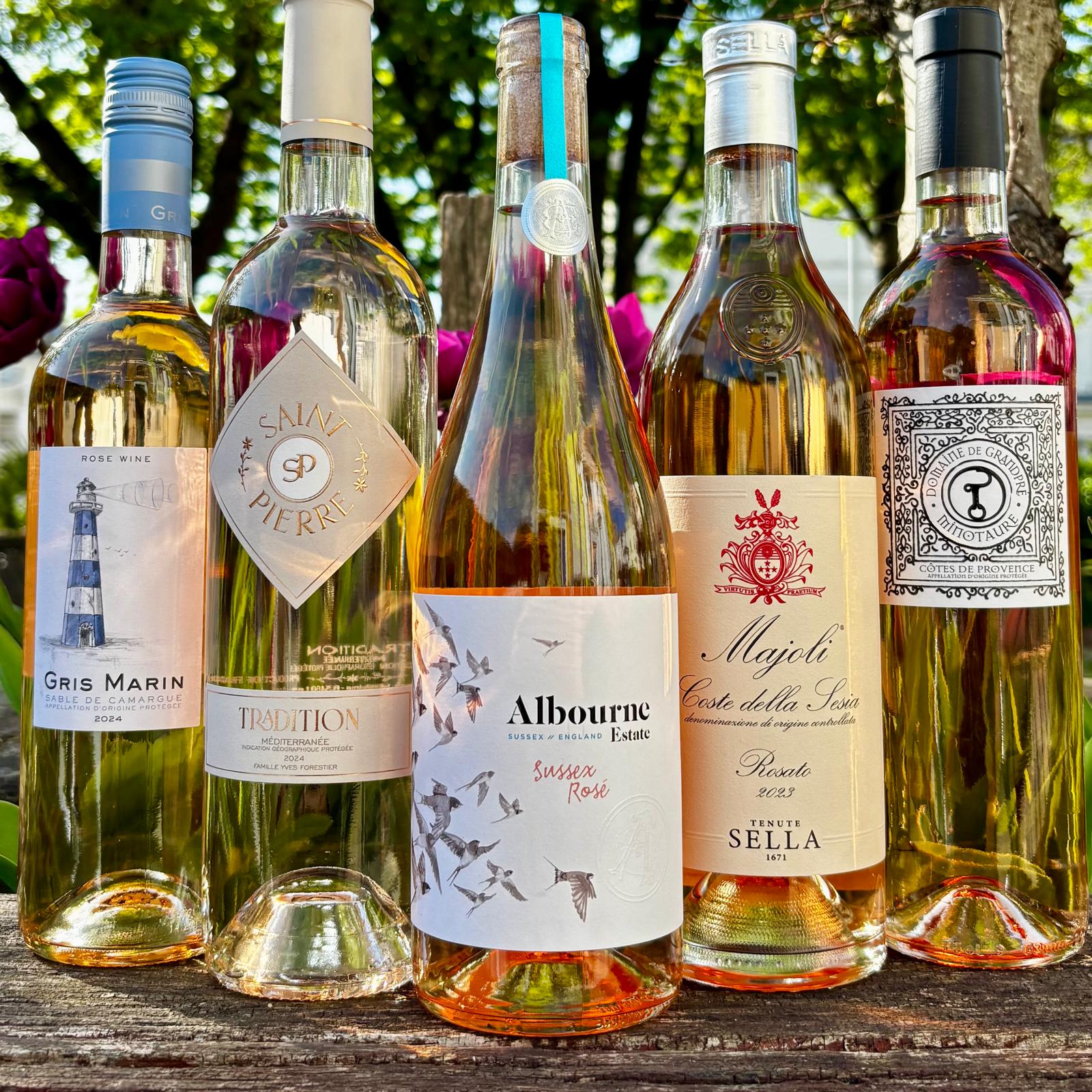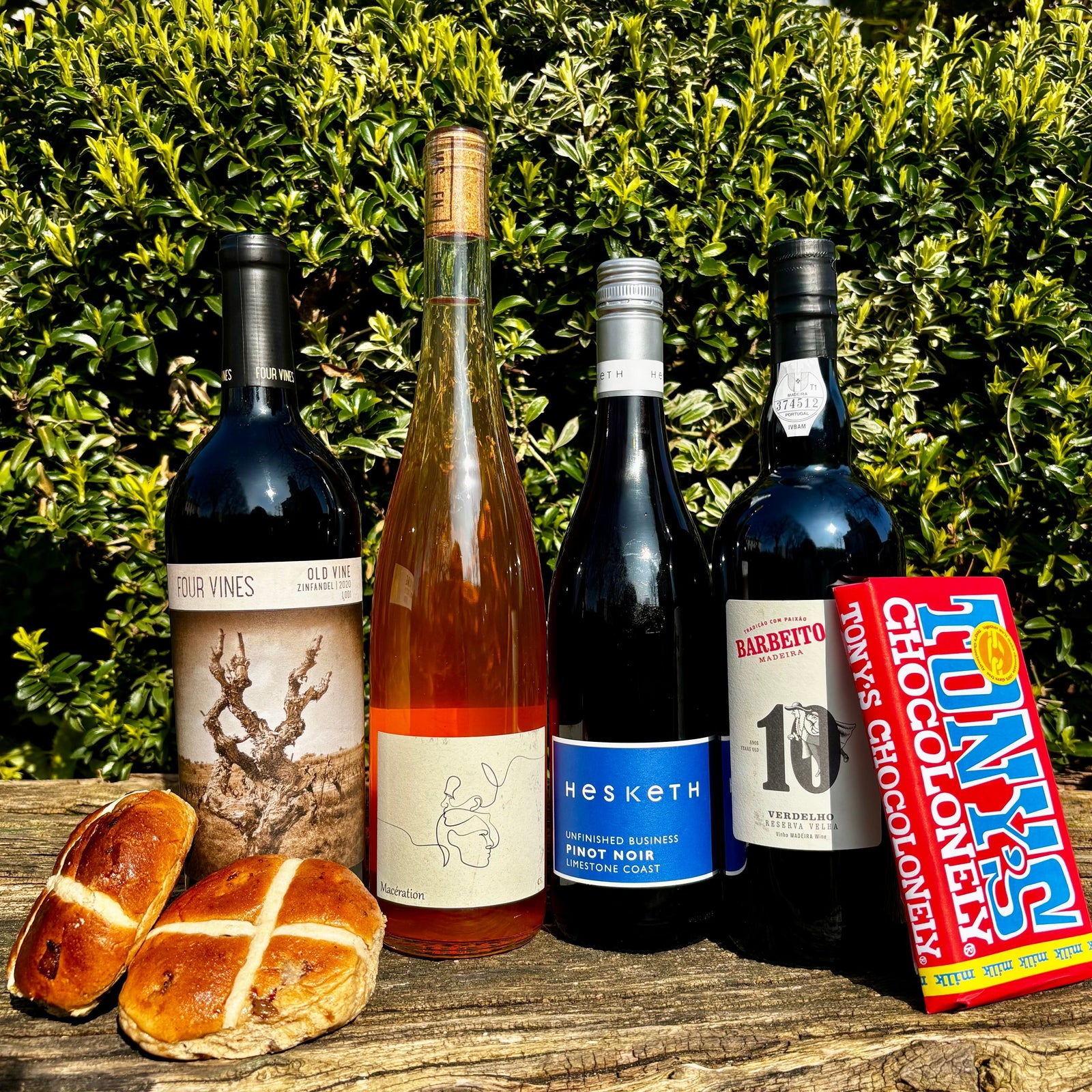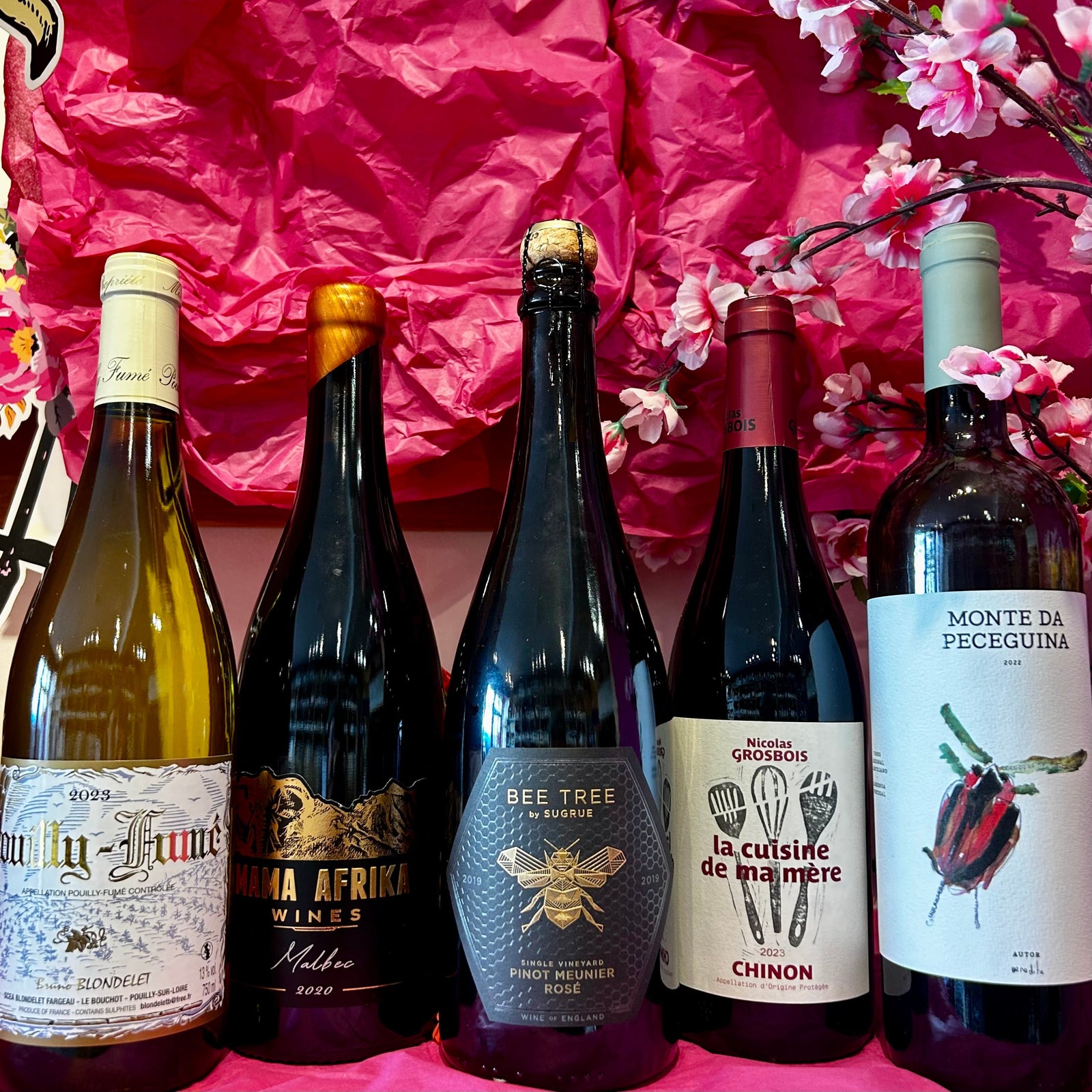
Garnacha (known as Grenache in France) originates from the Aragon region of Spain and is a late-ripening variety that loves warm climates. If I had to describe the character of a Garnacha wine in one word it would be 'friendly' - light in tannins, round in body and with abundant fruit ranging from wild strawberries to black cherries depending on where it's grown.
There are white and pink-skinned variations of Garnacha (Garnacha Blanca and Roja) but for this blog I will be focusing on the black-skinned Garnacha Negra or Grenache Noir.
Spain
In Spain Garnacha is the second most planted red grape, behind only Tempranillo. It finds homes all across the country, but is particularly widely grown in eastern and central Spain.
In Spain's most famous wine region, Rioja, Garnacha has long been in Tempranillo's shadow as its light tannins and fresh fruitiness are less suited to the heavy oak use that has been popular here in the last 100 years. Recently, however, more winemakers are putting the spotlight on Garnacha as they look to produce more fruit-driven wines and make use of the excellent old bush-planted vineyards throughout the region.
Gomez Cruzado Linea Karman Rioja Tinto 2021 - £12.99

A historic winery dating back to 1886, Gomez Cruzado are definitely not resting on their laurels. A forward-thinking approach has seen them explore a wide range of styles, including this delicious unoaked red.
The Karman Tinto is predominantly bush-vine Garnacha from the cool Cardenas river valley, supplemented with a small portion of Tempranillo. Whole berry fermentation and ageing in stainless steel are utilised to maximise the fruity expression in this wine.
Abundant red and black berry fruit fills the nose, reminiscent of English summer pudding, with a subtle peppery hint. On the palate it is smooth and juicy, with a lightness that belies it's 14.5% alcohol. Easy-going enough to drink by itself, it also makes for a lovely pairing for roasted vegetables or tomato-based dishes.
The Sierra de Gredos, to the west of Madrid has experienced a meteoric rise out of obscurity over the last twenty years. Driven by winemakers like Telmo Rodriguez, Daniel Ramos and Commando G, the old-vine, high altitude vineyards of this mountainous region have developed an excellent reputation for silky, aromatic reds. Viticulture here is incredibly challenging, many sites had been abandoned for years before recovery, and the steep slopes and isolation prevent the use of mechanisation.
Daniel Ramos Zerberos El Altar 2017 - £37.50

Producer of the ever popular El Berrakin, Daniel Ramos is one of the most exciting young winemakers in Spain. El Altar is one of his top single vineyards, a tiny north-facing slope of 70-90 year old vines at 800m altitude. Ramos' winemaking meets all the criteria of a natural wine (organic farming, no additions besides a drop of sulphur at bottling, no fining/filtration), but the wines are always clean and display marvellous purity.
High-toned, profound and complex on the nose with wild strawberry and raspberry fruit, floral notes of bergamot and rose, pine and thyme aromas and a warm stony mineral quality. The palate displays stunning balance of ripeness and acidity, with lithe velvety tannins and a lasting finish of cranberry and anise. If you want to experience Spanish Garnacha at its finest, look no further!
France
Grenache is grown all throughout the south of France, from the Roussillon to Provence. While there are single-varietal wines made, French winemakers tend to use Grenache in blends. The most common blending partners are Syrah and Mourvedre, with Carignan and Cinsault often involved as well.
France's finest Grenache-based wines are to be found in the Southern Rhone. Chateauneuf-du-Pape, Gigondas, Vacqueyras and a number of other regions here produce full-bodied wines, often suitable for long-term ageing. The quality of a well-made 'basic' Cotes-du-Rhone is certainly not to be underestimated either!
Domaine Lafond Roc-Epine Cotes-du-Rhone 2021 - £15.99

Domaine Lafond maintain pristine organic vineyards across a number of Southern Rhone appellations, with the fruit for this wine coming from between Lirac and Tavel. A blend of 70% Grenache with 30% Syrah, selected from two different parcels. One, on limestone, gives fruit with a little more acidity while the other from the Rhone's famous 'galets roules' stones provides riper fruit.
Cherry and brambly blackberry fruit aromas are joined by black pepper and olive notes from the Syrah. The palate is full-bodied, with ample dark fruit, ripe tannins and hints of wild herbs and undergrowth characteristic of Rhone wines.
Further east in Provence, Grenache's fruit-forward nature and ability to retain fresh acidity in hot climates makes it the backbone of the region's famous roses. Sadly, in my opinion, Provence rose has had its reputation damaged in recent years by large industrial wineries putting more effort into celebrity marketing campaigns than into making really great wine. But if you look hard you can absolutely still find real gems, true wines of place and character grown amongst the pines and the garrigue.
Domaine de Grandpre Cuvee Minotaure, Cotes de Provence 2022 - £18.25

Under owner Valerie Vidal-Revel, Domaine de Grandpre are quietly producing some of Provence's finest wines. Farming organically, without certification, and vinifying with extreme care in the cellar give wines of brilliant purity and concentration.
Their top wine, the Cuvee Minotaure, comes from a single plot of their oldest vines. Grenache, Mourvedre and Cinsault were planted here in 1973 on a south-facing slope of rugged pink granite. The grapes are harvested by hand before dawn, ensuring they can be lightly macerated without warming up which prevents oxidation or extraction of tannin.
On the beautiful nose floral notes of lily and jasmine join the soft apricot and raspberry fruit notes. The palate is dry, with fine focus and acidity, lovely breadth and length of flavour. A brilliant food wine, try this with grilled fish, salad nicoise or caponata.
Sardinia
Arriving on the island when it was part of the Kingdom of Aragon, Garnacha is known in Sardinia as Cannonau - Sardinian winegrowers will, however, dispute this, claiming that Cannonau was the original variety taken to Spain at this time. The evidence points to the former as the more likely story, but we are unlikely to ever have a complete answer to how this grape moved around the Mediterranean approximately 600 years ago.
Sardinia's most widely planted grape, Cannonau accounts for around a third of vineyards on the island and the DOC Cannonau di Sardegna covers the whole island. The very best examples come from the mountainous interior, where altitude and poor soil give concentrated wines with surprising freshness for this very hot climate.
Francesco Cadinu Perdas Longas Cannonau di Sardegna 2021 - £30.95

The sub-region that has carved out the finest reputation for Cannonau are the hillsides around the village of Mamoiada. At upwards of 650m altitude, an impressive array of very old plantings grow in loose granite soil. For this wine, Francesco Cadinu selects fruit from a number of vineyards all older than 70 years. Because the very low yields from these old vines, only around 4500 bottles are produced of this wine each year.
Hand-harvested fruit of exceptional ripeness is fermented using only the wild yeasts from the vineyard, without additions. The wine is then aged for 14 months in chestnut barrels, traditional for Sardinia. Chestnut is slightly more porous than oak, and has higher concentrations of phenolics, both of these lead to the softening development of longer-chain tannins - or more simply they give a smoother mouthfeel.
Aromatically this is so vibrant and lifted, there is something reminiscent of Barolo in its blood orange, dried herb and cherry perfume. Ripe and broad initially, with raspberry jam and brambly blackberries, the fine tannins and freshness then carry the palate through exotic spice, floral hints and dried cranberry in the extraordinarily long finish. An exquisite rarity, to pair with roasted game birds, braised lamb shanks or aged hard cheeses.
Rest of the World
Grenache (most places use the French name) has travelled globally, finding a home wherever heat is plentiful and precipitation scarce. Most commonly it is to be found in Rhone-style blends with its friends Syrah and Mourvedre, Australia and South Africa have some particularly fine examples. In the USA it was championed by the 'Rhone Ranger' movement, and is suited excellently to the hot and dry climates of Paso Robles and the Sierra Foothills.
Tooth and Nail Destinata Grenache, Paso Robles, California 2021 - £32.50

Tooth and Nail is the project of Rob Murray, who after years working in vineyards decided to take the plunge and turn his hand to the cellar. While they make wine across a number of brands with different styles, sustainability is at the core of everything they do - farming their own sites organically and donating to environmental causes through 1% For the Planet. The Destinata range is meant to challenge the perception of Paso Robles wines (often very heavy, dark and oaked) by producing wines of vibrant fruit and drinkability.
They utilise the carbonic maceration technique, most famous in Beaujolais, to produce this Grenache. Whole clusters are blanketed in carbon dioxide in stainless steel tanks leading to intracellular enzymatic fermentation within each berry - this produce beautiful sweet fruity aromas unique to this method. The wine is then transferred to old oak barrels for a short ageing period before bottling.
Strawberry, tangerine, black tea and herbal aromas, with a hint of bubblegum, on the nose. The palate is light in body but packed with juicy cherry and berry fruit with some cedar and cinnamon adding depth. An extremely joyful and unique wine, a far cry from many challengingly tough California reds. Its ripe fruit and light tannins make for a wine that pairs deliciously with a bit of spice, such as Sichuan cuisine.
We have many, many more Garnachas and Grenaches on our shelves for you to try and I hope you will be inspired to discover the ways that this grape can change around the world!









Leave a comment (all fields required)